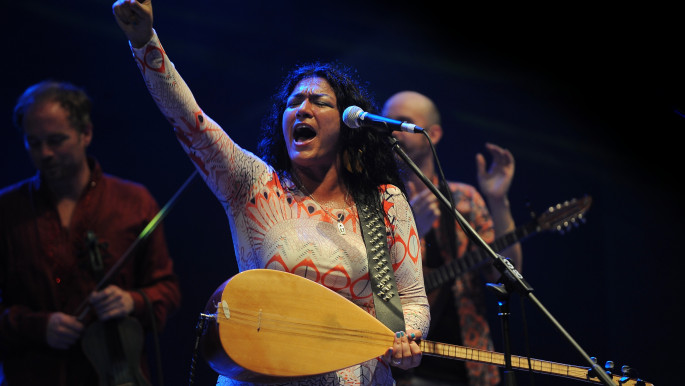
Arts Canteen: Stirring the arts, promoting resilience and tolerance
The band played a mix of Arabic, Middle Eastern and Western music. In addition to cheerful love songs, Nadeen sang about surviving and sharing stories as a way to cope with "scars of wars and loss".
Nadeen's powerful songs reflect her determinations to keep on embracing life, singing and dancing to cope with her grief. Nadeen is a refugee now living in Sweden.
"Let's talk and be more open," she told me. "Let's talk about our happiness and our grief. There are people who do not like to talk about how they feel. They are ashamed of letting their vulnerability show. But I think my vulnerability with your vulnerability becomes power."
This concert was organized by Arts Canteen, an organisation presenting Arabic arts and culture to UK audiences, supporting independent and emerging artists, challenging stereotypes and enriching cultural diversity and mutual understanding.
Arts Canteen was established in 2011, has been curating events, exhibitions and festivals - helping to organise events such as the Nour Festival, Shubbak Festival, Eid on the Square, The London African Music Festival as well as the Liverpool Arab Arts Festival.
Al-Saqqa, Arts Canteen's founder, is on a mission to bring people closer through art and music, while encouraging people to stay resilient in the face of tragedies in the Middle East.
As a Syrian living in London, Arts Canteen is a lovely reminder of home. It has also introduced me to artists from Arab and Middle Eastern countries, such as the Palestinian singer Reem Kelani, Moroccan singer Oum, Turkish singer Olcay Bayir and British Iraqi Oud Player Attab Haddad.
 |
|
Nadeen's powerful songs reflect her determinations to
keep on embracing life [Getty] |
Once I went to a concert without even knowing the singer or the band, trusting the quality presented by Arts Canteen.
At the concert, al-Saqqa warmly welcomed the audience as if he were welcoming them to his own home, introducing the Tunisian singer Ghalia Benali. She appeared on stage wearing a black dress and holding a feather in her hand.
I looked at a friend and jokingly said in Arabic: "A' rasa reesheh" which translates as "a feather is on her head" - a metaphor used to describe elites and VIPs. Ghalia sang a mix of contemporary and old Arabic songs in a wonderfully cheerful charismatic style and by the end of the concert, I looked at my friend again and told him: "She truly deserves a feather on her head!"
One of my favourite Arts Canteen events was a screening of the documentary, The Pianist of Yarmouk, featuring the Palestinian Syrian pianist Aeham Ahmad, who used to play songs of peace and hope in the rubble of Yarmouk Refugees Camp in Damascus, before fleeing to Germany.
The screening was followed by a Q&A with the film-makers. The pianist, Aeham, himself joined the Q&A by phone from Germany, presenting his inspirational story of resilience and hope. For me, it was a wonderful opportunity to speak to Aeham about his experience of playing music to help people cope with the pain and wounds of war.
Arts Canteen events aim to tackle stereotypes about Arabs in the UK - one way of doing that is through the sell-out "Arabs are not Funny" stand up comedy show, now in its seventh run and on its way to the Royal Albert Hall.
 |
Let's talk and be more open. Let's talk about our happiness and our grief. There are people who do not like to talk about how they feel. They are ashamed of letting their vulnerability show. But I think my vulnerability with your vulnerability becomes power. - Nadeen al-Khalidi |
 |
I enjoyed the "Arabs Are Not Funny" show even though I am never able to laugh at an Islamic State group joke, no matter how funny it might be. But it was good to see others laughing and hopefully learning about the Middle East through these jokes.
Similarly, during the TarabBand concert, I could not dance or cheer to a song about a little refugee girl sinking in the sea while trying to escape war and found it hard to hold back tears. Actually, I saw some girls crying to that song and when I spoke with one, Abeer from Egypt, she said that even while they shed tears at the sad reality of refugees from Arab countries, "what I love about Arts Canteen is that it brings us together. I was so touched."
Another concert-goer, Amalia, said: "Hearing Arabic music was very special as we are usually only hearing terrible things from the Middle East."
Al-Saqqa explained that their main challenge is securing funds to keep supporting independent and emerging artists. Beyond their current work, Al-Saqqa has dreams of turning the organisation into an actual cafe - with a permanent physical space to host all these activities under one roof.
Fardous Bahbouh is a journalist and translator living in London. Follow her on Twitter: @FardousBahbouh
![Tarabband - Arts Canteen [Getty] Tarabband - Arts Canteen [Getty]](/sites/default/files/styles/large_16_9/public/media/images/3EC033E1-3847-4881-891B-A54C931ED4D7.jpg?h=d1cb525d&itok=5vvj_Gjh)

![President Pezeshkian has denounced Israel's attacks on Lebanon [Getty]](/sites/default/files/styles/image_684x385/public/2173482924.jpeg?h=a5f2f23a&itok=q3evVtko)



 Follow the Middle East's top stories in English at The New Arab on Google News
Follow the Middle East's top stories in English at The New Arab on Google News


